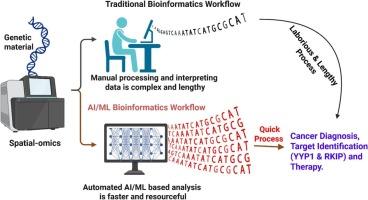人工智能在癌症空间转录组学研究中的进展:重点关注阴阳1 (YY1)和Raf激酶抑制蛋白(RKIP)。
IF 9.7
1区 医学
Q1 BIOCHEMISTRY & MOLECULAR BIOLOGY
Biochimica et biophysica acta. Reviews on cancer
Pub Date : 2025-09-22
DOI:10.1016/j.bbcan.2025.189456
引用次数: 0
摘要
空间转录组学(ST)在癌症研究中发挥着关键作用,为癌症微环境中的基因表达提供了独特的视角,进一步彻底改变了我们目前对这一主题的理解。从通过保留空间背景来解决传统大体积RNA测序的局限性开始,本文讨论了整合机器学习(ML)、人工智能(AI)和统计学方法来解释肿瘤学中ST数据的重要性。在本文中,我们使用涉及Raf激酶抑制剂蛋白(RKIP)和盈阳1 (YY1)的研究实例来说明所讨论的一些ST技术的应用。我们探索如何应用监督学习技术,如支持向量机(svm)和随机森林(RFs),可以显著帮助进一步的癌症分类和预测临床结果,并推进个性化医疗。此外,探索无监督学习方法,如聚类和降维方法(PCA, t-SNE, UMAP),使我们能够看到ST数据中可能被忽视的隐藏结构。这篇综述讨论了最近几年引进的工具和技术,强调了ML、AI和统计方法给ST带来的转变,这些方法为研究致癌驱动因素(如YY1和RKIP)、癌症异质性以及癌症治疗中的个性化医学方法提供了新的见解。本文章由计算机程序翻译,如有差异,请以英文原文为准。

Advances in artificial intelligence for spatial transcriptomics in cancer: Special focus on Yin Yang 1 (YY1) and Raf kinase inhibitor protein (RKIP)
Spatial transcriptomics (ST) plays a pivotal role in cancer research, offering a unique perspective on gene expression within the cancer microenvironment, further revolutionizing our current understanding of the subject. From addressing the limitations of traditional bulk RNA sequencing by preserving spatial context, this review discusses the importance of integrating machine learning (ML), artificial intelligence (AI), and statistical methods for interpreting ST data within oncology. Herein, we use examples from studies involving Raf kinase inhibitor protein (RKIP) and Ying Yang 1 (YY1) to illustrate applications for some of the ST techniques discussed. We explore how applying supervised learning techniques, such as Support Vector Machines (SVMs) and Random Forests (RFs), can significantly help further cancer classification and prediction of clinical outcomes and advance personalized medicine. Additionally, exploring unsupervised learning approaches like clustering and dimensionality reduction methods (PCA, t-SNE, UMAP) allows us to see hidden structures in ST data that may be overlooked. This review discusses recent tools and techniques that have been introduced within the last few years, underlining the transformation brought into ST by ML, AI, and statistical methods that provide new insight into oncogenic drivers such as YY1 and RKIP, cancer heterogeneity, and avenues for personalized medicine approaches in cancer treatment.
求助全文
通过发布文献求助,成功后即可免费获取论文全文。
去求助
来源期刊

Biochimica et biophysica acta. Reviews on cancer
医学-生化与分子生物学
CiteScore
17.20
自引率
0.00%
发文量
138
审稿时长
33 days
期刊介绍:
Biochimica et Biophysica Acta (BBA) - Reviews on Cancer encompasses the entirety of cancer biology and biochemistry, emphasizing oncogenes and tumor suppressor genes, growth-related cell cycle control signaling, carcinogenesis mechanisms, cell transformation, immunologic control mechanisms, genetics of human (mammalian) cancer, control of cell proliferation, genetic and molecular control of organismic development, rational anti-tumor drug design. It publishes mini-reviews and full reviews.
 求助内容:
求助内容: 应助结果提醒方式:
应助结果提醒方式:


